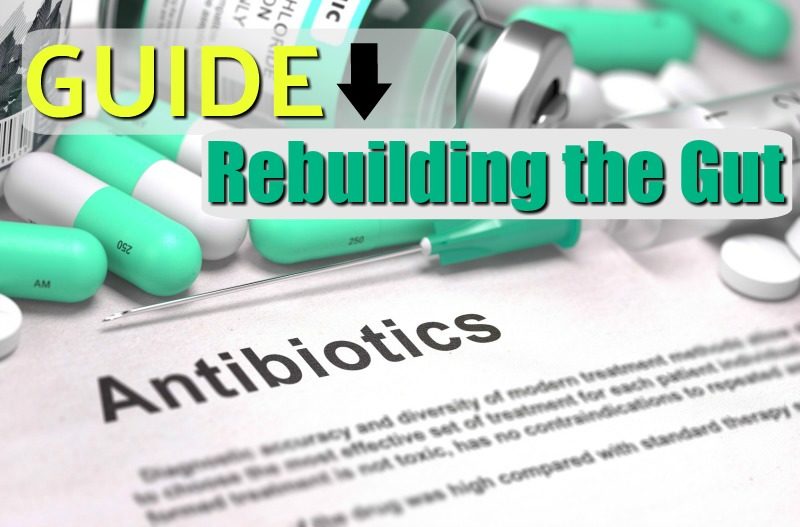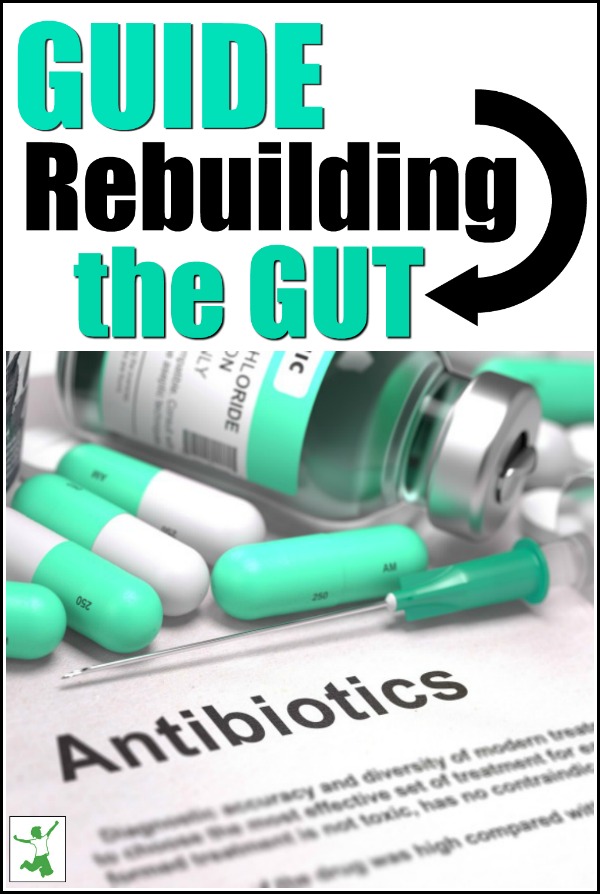
Antibiotics are truly a wonder of modern medicine. Never in a million years did the scientists that developed them think that nearly 100 years later, people would desperately need to take action to repair the gut after antibiotics are taken.
Beginning with the discovery of penicillin by Alexander Fleming in 1928, the pure magic of antibiotics with their rapid resolution of bacterial infections of all kinds caused many in the medical profession to become completely enamored with the drug-based approach to illness. By 1940, antibiotics had come into widespread use causing both doctors and people to gradually forget about tried and true techniques for preventing illness such as the age-old remedy cod liver oil.
This change in the medical paradigm has led in recent decades to abuse of these magical meds and the growing threat of antibiotic-resistant bacterial strains. It has also caused an epidemic of people with compromised gut function due to an imbalanced intestinal environment resulting from excessive exposure to antibiotics via industrially produced foods, medicine, and more recently, groundwater contamination.
While antibiotics clearly have their place in treating life-threatening bacterial infections, their overuse has led to a plethora of modern-day health challenges and autoimmune diseases.
While complete avoidance of all antibiotic exposure would be ideal, it is simply not practical in the majority of cases. Sometimes, antibiotics are necessary and when such a situation arises, it is imperative to protect the gastrointestinal tract from fungal or yeast overgrowth during treatment and to replenish beneficial gut bacteria when the course of antibiotics is complete.
While antibiotics effectively kill both pathogenic and beneficial bacterial strains with the exception of antibiotic-resistant species of streptococcus and other strains, they do not affect the many forms of yeast such as Candida albicans naturally found in the body in a non-dominant role. They also have no effect on the newly emerging super fungus Candida auris.
As beneficial bacteria lining the gut wall are eliminated, yeasts like Candida albicans have the opportunity to overgrow and become dominant by attaching to the gut wall. Once attached to the gut wall, yeast has the ability to create lesions in the cell membranes. This can lead to the syndrome referred to as “leaky gut”, which increases the likelihood of foreign proteins entering the bloodstream resulting in inflammation, food intolerances, a myriad of digestive problems, autoimmune disease, and other associated imbalances.
If you or a loved one find yourself in a situation where antibiotics are critically necessary and cannot be avoided with holistic therapies, the following recommendations for support during and after antibiotic treatment can help minimize the damage to the gut environment and quickly rebuild gut flora at the conclusion of treatment.
Repairing the Gut After Antibiotics
These recommendations are provided to patients of the clinic Biodynamic Wellness which specializes in helping people recover and maintain the optimal balance of the intestinal environment to encourage vibrant health free of chronic disease stemming from a compromised gut. The owner of Biodynamic Wellness, Kim Schuette CN, generously gave permission to share the recommendations listed below.
Please note that these recommendations are helpful whether the antibiotic treatment came from oral medication or IV treatment.
Contrary to popular belief, IV antibiotics also heavily damage gut flora despite the fact that the medication does not make its way directly through the intestinal environment like oral meds do.
Note that colonoscopies devastate gut flora in the same way. Hence, the protocol below is helpful to utilize if you must endure one for whatever reason.

Diet During and After Antibiotics
- Include generous servings of Lacto-fermented dairy and cultured vegetables during and after antibiotics whether oral or from an IV treatment. One tablespoon to half a cup of yogurt, kefir, kimchi, sauerkraut, beet kvass, etc. two to three times daily is advisable.
- Include gelatin-rich foods such as homemade meat stocks and bone broths daily along with abundant vegetables, animal fats, coconut oil, and skate or cod liver oil after antibiotics are completed. Powdered gelatin can be used to further boost homemade soups and sauces.
- Avoid all refined carbohydrates and fruit juices.
Support During Antibiotics
- Saccharomyces boulardii: one capsule twice daily to discourage yeast overgrowth during antibiotic treatment when beneficial gut flora is being compromised.
This particular strain is very important to maintaining gut wall integrity throughout a round of meds and keep Candida in check.
Gut Replenishing Supplements
Note the following probiotic supplements to take and how long to take each to give the gut its best chance to repair quickly.
- After antibiotics (or a colonoscopy), make sure to take a high quality probiotic. Suggested brands are listed on my Shopping Guide which I often re-vett for ingredient changes. Take twice daily for 60 days ideally after meals.
- Saccharomyces boulardii: one capsule twice daily to discourage yeast overgrowth during the gut flora recovery phase. Be sure to continue for 30 days.
- Note that not all beneficial bacteria are created equal for repairing the gut. Be sure to match specific probiotic strains to the function you wish it to perform and the ailments you are working to resolve.
This short video summarizes the protocol.
More Information
Are Antibiotics Always Necessary for Strep Throat?
The 11 Best Natural Antibiotics and How to Use Them
Why Antibiotics Today Could Threaten Your Life Tomorrow
How to Kick Strep Throat Faster and Better Without Antibiotics








My elderly mother had repeated bouts of C.Diff…a particularly nasty and potentially deadly overgrowth that’s typically hospital-acquired. She’s now quite debilitated and has moved into my home where we care for her. She’s been taking ‘Florastor” for a year – Saccharomyces boulardii lyo, a friendly yeast found naturally on the skin of tropical fruits lychee and mangosteen This is the pro-biotic her doctors prescribed in the nursing home and now we are buying over-the-counter. It’s managed to keep her free of C-diff, which is no small feat and a great boon to our lives. Not positively sure we can attribute this entirely to Florastor but it is the only probiotic she takes (because it was paid by insurance)
I read a lot of natural-health blogs and websites. Never has Florastor is been mentioned among the helpful probiotics. Does anyone know why?
I attended a probiotic symposium hosted by Klaire Labs. I asked them if Florastor was a good quality probiotic and they said that it was, but said that not all s.boulardii supplements are high quality. Florastor does not mention anything about any of the other ingredients in the product though. The dose is also in mg not CFUs.
Try incorporating Oil of Oregano and diatomaceous earth into her supplement regime. Google to find out more about them.
Never a reason for antibiotics, colloidal/ ionic silver is the best!
Unfortunately, colloidal silver doesn’t work for everything. I’ve tried it for more chronic or serious situations and it didn’t work. It may have helped some, but in the end, I had to try the antibiotics. I am so glad we have them, although they are overused and we do need to remediate their effects.
Doesn’t it take a year or so for your gut to recover? I remember Chris Kessler had an article on that ….
Jonathan Bryant
Deirdre Remmers
colds and flus are viruses, and antibiotics are of no use against them
I am required to get a Flu Shot, which I haven’t ever, ever in my life had, because of school. They will not let me proceed without the shot. How do I protect my body before during and after? I’m afraid. Seriously! (I live in Colorado) Thank you for any advice. Monday is the day.
Rosalinda,
Nothing is more important than your health, including school. Just one flu shot could change your entire life on a dime, for the worse (read the chapter by Lisa Marks Smith in the book Vaccine Epidemic). CO has a personal beliefs exemption to vaccination. Why won’t your school accept this? I am going to assume that you are in college, and possibly pre-med, and are being told you need the flu shot to do your in-hospital training. I am guessing that it is the hospital that is requiring the flu shot since the school would accept the PBE. You can find sample letters online for nurses to use when challenging the vaccine requirements of hospitals. There is also a FB page for nurses who oppose mandatory vaccines with regards to their employment. Perhaps you can find a doctor who will write a medical exemption for you. You should NEVER be forced to accept any medical treatment or procedure. Many are changing their career goals due to ever-increasing vaccine requirements in certain fields. Perhaps that should be considered, or, be the one who challenges the system! Maybe you can find a lawyer, with the help of NVIC, who would take your case pro-bono should you want to challenge these tyrannical and barbaric vaccine requirements.
Should you choose to allow yourself to be injected with the flu vaccine, look up Dr. Russell Blaylock’s protocol for what to do pre and post-vaccination to reduce the side effects.
I will be praying that you find a safe solution for your situation.
The rear time I had to take antibiotics i do this, although Saccharomyces boulardii capsule is new to me. I will remember it. The recovery from illness was always fast in this way you recommend. This is kind of like best of both worlds. Illness doesn’t have a change.
i can not read your article from my mobile Sarah, lovelink.us trying to upload something to the app center..
Drugs just mask the symptoms, you still have the cold or flu.